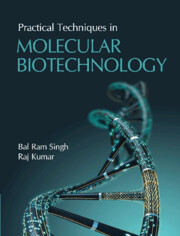5 - Molecular Biology
Published online by Cambridge University Press: 15 October 2021
Summary
Introduction
Molecular biology is the study of the molecular basis of biological processes in living organisms. These include understanding the interactions between biomolecules that form the basis of life as well as the regulation of these interactions. Of particular significance to molecular biology are the nucleic acids (DNA/RNA), proteins and their synthesis. Nucleic acids are the fundamental constituents of a living cell where they function to encode and transmit genetic information needed for the continuity of life in every tissue and organism.
In just over 60 years since the discovery of the structure of DNA by James Watson and Francis Crick, and 40 years since venturing into the revolutionary area of genetic engineering, the concepts of molecular biology have gained a strong foothold in routine household conversations. DNA, RNA, 23andMe, and enzymes have become the subject of interesting discussions on television, newspapers, and business weeklies. The field of microbiology is important not just for scientists and practitioners in the field, but even common people seem curious for insights into the genomics, diagnostics and serology of pathogens, for example, after the outbreak of Covid-19 in 2019. The astonishing scientific discoveries in the field of molecular biology have led to an understanding of the complex biological processes of life and its evolution.
Heredity is the transmission of characteristics from one generation to the other in all forms of life on earth. Much of the understanding of heredity originated in the 1800s, from the pioneering research of Gregor Mendel, an Augustinian monk. He studied the characteristics of parents and offspring in pea plants and defined the “law of combination of different characters” which described the gene as a carrier of hereditary traits. The relation between genetic material and DNA, however, was not demonstrated until the middle of the twentieth century during which time scientists continued to explore the nature of genes, study the behavior of chromosomes during cell division, and the chemical composition of the nucleic acids. Several lines of evidence from a combination of studies carried out within a living organism (in vivo) and those performed in cell or tissues grown in culture or in cell extracts (in vitro), converged to define DNA as the unvarying bearer of heredity. This realization led to the elucidation of the structure of DNA, the molecule of life, and marked the beginning of the development of molecular biology.
- Type
- Chapter
- Information
- Practical Techniques in Molecular Biotechnology , pp. 169 - 240Publisher: Cambridge University PressPrint publication year: 2022

